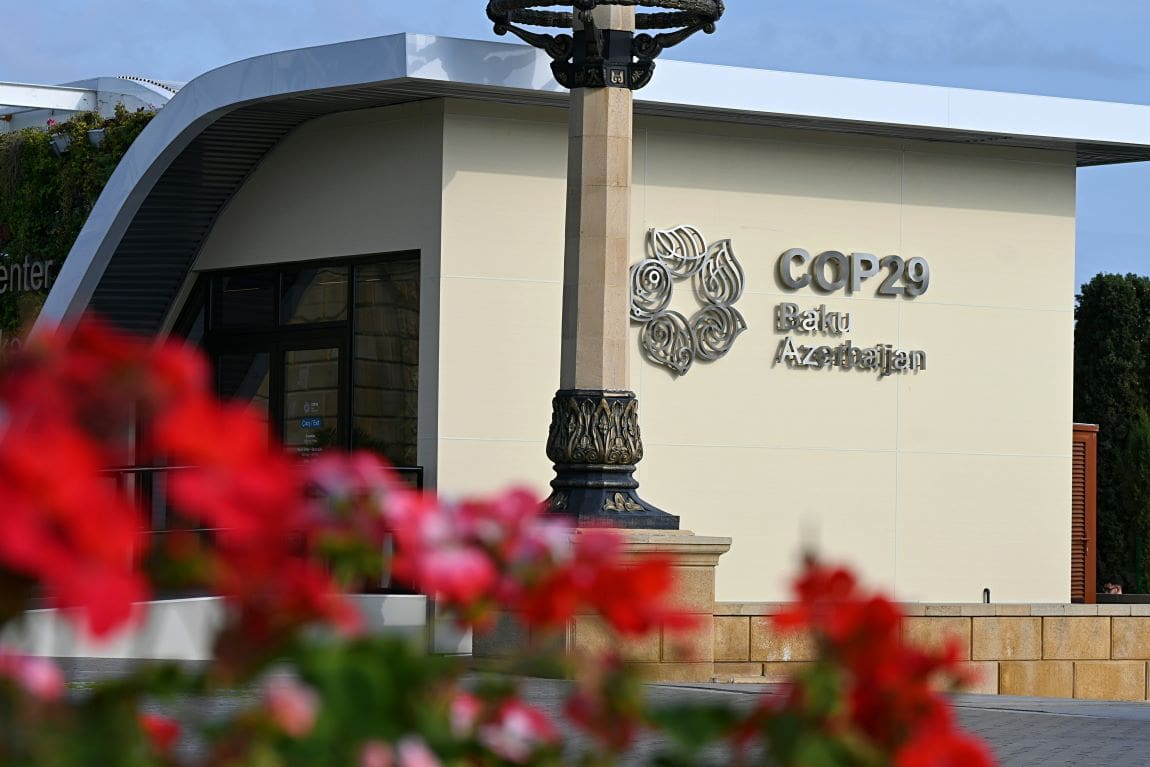By Delphine Paysant with Kelly Macnamara in Paris
Baku, Azerbaijan | AFP – Oil executives and lobbyists descended on COP29 in Baku for “energy day” Friday, as environmental groups denounced the presence of the fossil fuel industry at the UN climate talks.
While negotiators haggled over the key goal of an increase in climate funding, a former UN chief denounced the talks as “no longer fit for purpose”.
The head of France’s TotalEnergies, Patrick Pouyanne, told AFP the sector is “part of the problem”, but insisted it was making “continuous progress” on transition.
The “Kick the Big Polluters Out” (KBPO) coalition of NGOs analysed accreditations at the annual climate confab, calculating that more than 1,700 people linked to fossil fuel interests are in attendance.
“The fossil fuel industry is creating havoc in people’s lives, the fossil fuel industry is responsible for destruction,” said Makoma Lekalakala, a South African environmental campaigner.
The presence of oil, gas and coal interests at the climate talks has long been a source of controversy, and the appointment of UAE state oil firm head Sultan Al Jaber to head last year’s negotiations in Dubai stoked criticism.
This year’s host is energy-rich Azerbaijan, whose President Ilham Aliyev on Tuesday repeated his insistence that oil and gas are a “gift of God”.
Former US vice president and climate activist Al Gore warned Thursday that “the fossil fuel industry and the petrostates have seized control of the COP process to an unhealthy degree.”
While the Dubai summit produced a global agreement on “transitioning away” from fossil fuels, the follow-up commitment “has been very weak” and the issue “is hardly even mentioned” at COP29, he said.
“I have to think that one of the reasons for that is that the petrostates have too much control over the process.”
– ‘No longer fit for purpose’ –
A group of leading climate activists and scientists including former UN secretary general Ban Ki-moon warned Friday that the COP process was “no longer fit for purpose”.
They urged smaller, more frequent meetings, strict criteria for host countries and rules to ensure companies showed clear climate commitments before being allowed to send lobbyists to the talks.
Michai Robertson, lead negotiator on climate change for the Alliance of Small Island States, said the talks remained crucial for vulnerable nations shut out of forums like the G20.
“That is the only time that our voice can be clearly heard,” he said.
KBPO said Japan brought employees of coal giant Sumitomo as part of its delegation, Canada included oil producers Suncor and Tourmaline and Italy brought employees of energy giants Eni and Enel.
However, some of those on the NGO list work for companies that are not primarily fossil fuel-related, including Danish offshore wind champion Orsted.
The top priority at the talks is a new figure for climate finance to help developing countries adapt to climate change and transition their economies away from fossil fuels.
Rich nations are reluctant to spend much more than the $100 billion a year already committed, conscious of domestic publics angry about inflation and stuttering economies.
But developing countries warn they need at least $1 trillion to defend against the ravages of climate change and meet commitments to reach net-zero emissions.
Negotiators are struggling to agree a workable draft text before ministers arrive next week.
“We must be honest, we believe that the pace of their work is currently too slow,” warned COP29 lead negotiator Yalchin Rafiyev on Friday afternoon.
Hanging over proceedings is the question of what role the United States will play on climate action and funding after Trump returns to the White House in January, given his pledge to again withdraw from the landmark Paris agreement.
American officials at the talks have insisted Trump will struggle to undo the climate action already in motion.
“When history is written, he will be looked at as a speed bump on the tremendous growth of this clean energy transition,” the Democratic governor of Washington state, Jay Inslee, told an event Friday.
bur-sah/lth/fg
© Agence France-Presse
Featured image credit: Dario Daniel Silva | Unsplash




